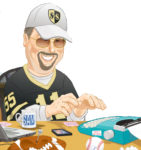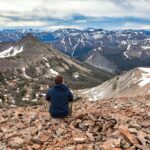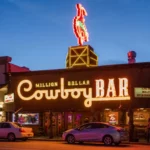When I was in grade school I would often go over to my best friend Rudy’s house for Friday night sleepovers. While we would watch “Happy Days” and play hoops for hours in his driveway, Rudy’s Dad sat quietly in the dining or living room reading print versions of three newspapers: the Wall Street Journal, Washington Post, and New York Times. He would read and read.
Every time I went there. Saying very little, he absorbed the news in solitude. I remember thinking about how it could be that a man could fill his mind with so much information and not say much about it.
Rudy’s Dad, whose real name was Normal Charles Miller, went by “Mike” and his kids gave him the name “Mel” because he looked like Mel Cooley who was on the 1960s “Dick Van Dyke Show.” His glasses were noticeable like Mel Cooley’s.
I found out why Mel was reading all the time. He had studied journalism at Penn State and then went on to become a reporter in the D.C. office of the Wall Street Journal for decades and along the way won a Pulitzer Prize for an investigative book called “The Great Salad Oil Swindle” about business corruption.
He was an authentic journalist from a previous era, a member of America’s Greatest Generation who dedicated himself to his profession with a passion and seriousness that was noticeable and awesome. All without talking much. All the while reading and reporting and writing stories published in one of America’s most respected newspapers.
Years went by and as I was graduating from college I started having serious yet aimless thoughts about becoming a writer. The one writer I knew better than any other while growing up was Mel. On a lark and completely adrift, I decided I was going to drive across America from D.C. to Southern California. I went there contemplating writing and had an obsession with seeing Southern California because I had heard Beach Boys songs about California girls and surfing that sounded like the perfect place to spend the rest of my life.
A few years earlier Mel and his wonderful wife, Elf (Molly), had moved to Pasadena, California because Mel had taken a new job as the national editor of the Los Angeles Times. I figured it was time to talk to Mel about a life dedicated to writing.
He and I sat on his back patio and talked, he an established professional, me a confidence-lacking college graduate grasping for something to hang onto. He asked what type of writing I was interested in. I wasn’t sure but I said creative writing in which I could express my thoughts freely.
“That’s not journalism,” he told me.
He wanted me to know what journalism was so I was clear on what type of writing careers I could pursue and what they would be about. I remember wading in his pool on a raft being completely lost in terms of what to do with my life, listening to Mel’s wisdom. He wasn’t coddling me even though I was his son’s best friend. He was telling me the truth, a journalistic value.
He asked if I was interested in going to journalism school. I told him I was even though I wasn’t sure. He set up a call for me with a journalism professor at the University of Southern California. I spoke with the professor a few days later. The conversation was scary. The commitment involved sounded so hard and I lacked confidence I would succeed. The whole situation was so difficult to figure out.
I wasn’t sure I could commit to going to graduate school nor was I certain I wanted to be a journalist nor did I have much money and the clock was winding down on what to do: find a place in California, get a job doing something, anything, to survive, to eat.
Worried and lacking confidence, I started driving home a few days later all the way back through Utah and Kansas and Ohio and Pittsburgh and on to D.C.
Back at home. Still lost. More lost.
A few months later I got lucky landing my first free-lance journalism job writing about high school sports. I mailed Mel a few of my first published writing clips to let him know what I was up to and he wrote me lengthy letters with advice about journalism, the crucial importance of pitching story ideas to editors, and also comments on my writing: “Your writing is clean and sharp. Keep it up.”
The interesting thing about Mel is while he didn’t say much when he wrote his personality was brought forth. He was warm, kind, perceptive, smart, unpretentious, helpful, specific, and encouraging.
I don’t know if he really thought my writing was “clean and sharp” – I sure didn’t think it was after getting low grades on papers throughout college – but I felt a little better emotionally about my writing ability because a person of Mel’s professional stature shared his opinion. Mel’s encouraging words helped spur me on that maybe I could become a writer. Maybe I had the basic ability needed.
I continued writing newspaper sports articles, as many as I could, and never got tired of practicing the craft; not then and not now. I began to realize, however, that I needed foundational training how to be a journalist if I was going to progress in my career. I simply didn’t know a lot of the basics about how to structure a news story (inverted pyramid), how to ensure a story has balanced perspectives, what makes for a strong quote, how to write an opening paragraph. All were and still are harder than you may think.
So I turned to Mel again. I told him I was applying to The American University’s Master’s Program in Journalism in D.C. He made a phone call to another journalist he had come to know. His name was Richard Stout, a former Newsweek reporter who at the time was a journalism professor in the program. I was accepted and ended up in Richard’s class.
We talked about Mel and my relationship to him and I think Richard took a special interest and liking to me because I had a personal relationship with Mel. I remember a key comment around paragraph three on one of my reporting assignments: “Would you please just write a sentence right here telling me why this story is important and why anyone should read it?”
He was referring to the “nut graph” of a journalistic article. Early on you have to encapsulate in simple terms what the whole point of the article is. Sounds easy but it’s not especially sifting through mountains of research. From that one comment I learned about the importance of just writing a straightforward sentence capturing your main point. It’s useful advice.
When I finished a major project for Professor Stout, he told me he read my extensive list of sources and thought I still probably did a lot more work than even that huge list suggested. He was telling me he perceived me to be a legitimate worker, a dedicated researcher. I liked hearing that. At least I’m a good researcher if not a good writer, I remember thinking.
To this day I can assert, without exaggeration, that that journalism program, each and every moment, completely captivated for me. I fell in love with journalism and writing because it was creative, dynamic, a non-stop learning experience with an end-product needed that satisfies. All this made me feel alive.
To earn the master’s degree, students had to complete an internship with an actual journalism organization. Again Mel was there to help me land a summer internship with the Washington Bureau of the Los Angeles Times, the office he was in charge of from his office in Los Angeles.
There were dozens of well-seasoned reporters in that newsroom. It was intimidating. There I was, hardly a journalist at all, among super-seasoned professional journalists who had filed hundreds of stories at newspapers in other cities and towns to get to these prestigious positions covering national politics. I was out of my league and it was humiliating.
I remember being assigned to cover a story on Capitol Hill about the Hubble Telescope being flawed. For several hours I sat there taking notes not sure what I was doing but sure I was supposed to return to the office and write an article about it for the editors to review – that day and quickly.
If you’ve never been a journalist, it’s hard to explain how difficult it is to go out and cover a story about which you have no context and super quickly figure out what’s important, what the actual news is to pull from mixed with all the endless chatter. You doubt you know what’s important; you’re not sure. It’s so much information, but almost none of it matters, only the “news.”
When I returned to the office my editors told me the Associated Press had already posted a great lead about the hearing focused on one of the participants saying there would be another space disaster soon.
I hadn’t caught that statement and it never occurred to me it was the “news” coming out of the hearing. With all that was said so much having nothing to do with another disaster, this one seemingly throw-away line was actually “the story.”
That reporter knew what she was doing; I didn’t. Since then I have never forgotten that it doesn’t matter what all the talk is about at an event; the only thing that matters in journalism is the news – the startling statement, the unusual insights, the controversy. That could be said last or second to last or first and you have to catch it or you miss the story and that’s not going to help you advance in your journalism career.
I think I wrote a story that day for the LA Times but it didn’t get published. I didn’t have the skills they needed. And everyone in that newsroom knew it.
For the rest of the summer I wasn’t given assignments. They couldn’t trust that I could deliver what they needed. So I sat there thinking about where my journalism career might end up if it was going to have a journalism career at all. I felt like the 12th man on a basketball team, a benchwarmer, not important.
Later in the summer I called Mel asking if there was any way I could join the Los Angeles Times. He told me reporters for the newspaper usually have 10 to 15 years of experience working for another newspaper. He knew and I knew I didn’t have that. He told me what I didn’t want to hear but needed to hear.
So I moved on, landing my first real full-time journalism job as a business reporter covering the telecom industry for a small publisher. It was a great indoctrination into what journalism is all about: researching, writing, editing, publishing and non-stop deadlines.
Loved every second of it. Something about having to produce something on a deadline, time after time, day after day, week after week, becomes a consoling life cadence, gives your life stimulation and the feeling what you’re doing matters. You learn new things every day. Journalism is perfect for endlessly curious people like Mel and, to a lesser extent, me.
In my spare time I continued to write sports articles for newspapers. Again and again and again.
I was becoming a journalist.
Mel guided me.
A few years later I ended up taking a job in high tech public relations and did that for more than two decades. Writing news releases is, in a sense, a form of journalism and you send those to journalists. What I learned in journalism school and being one gave me a strong sense of what stories to pitch reporters.
Throughout all this I kept writing on the side particularly letters to the editor for the local newspaper and covering sporting events. Journalism never left me. I couldn’t let go of it. Writing was what I did, what I thought about, and it’s been a constant. Up to this moment, I continue to write. Yesterday I wrote an article based on research for publication. Basically, it was journalism.
Hundreds of articles, actually more like several thousand and more recently hundreds of blogs and hundreds more blogs, writing and writing.
Mel moved me and helped make me.
It was around this time that Rudy got married. At the rehearsal dinner it was Mel’s turn to stand up and speak which everyone wanted to hear because he spoke so infrequently. “Marriage,” he said, “is a thing of wonder.”
He’s so right.
Mel still lives in Pasadena. Rudy updates me on how he’s doing in his later years. A few months ago I called Mel. He asked what I was up to and it was satisfying to tell him I’m still writing. He sounded pleased to hear that.
He didn’t say too much. This man never has.
His actions spoke for him.
Mel, my most marvelous mentor, is and always will be a person of wonder.
Author Profile

-
Sammy Sportface, a sports blogger, galvanizes, inspires, and amuses The Baby Boomer Brotherhood. And you can learn about his vision and join this group's Facebook page here:
Sammy Sportface Has a Vision -- Check It Out
Sammy Sportface -- The Baby Boomer Brotherhood Blog -- Facebook Page
Latest entries
 BonusMay 11, 2024The Joker Was on the Timberwolves in Stunning Game 3
BonusMay 11, 2024The Joker Was on the Timberwolves in Stunning Game 3 BonusMay 11, 2024Wyoming Boat Ride Filled With Hope
BonusMay 11, 2024Wyoming Boat Ride Filled With Hope BonusMay 10, 2024Yellowstone Mountains, Volcanoes Overpower The Senses
BonusMay 10, 2024Yellowstone Mountains, Volcanoes Overpower The Senses BonusMay 9, 2024Like No Other Place on Earth: Wyoming
BonusMay 9, 2024Like No Other Place on Earth: Wyoming

